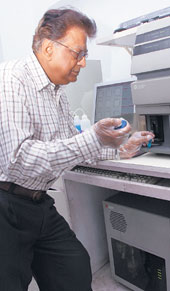 |
| ANALYSE THIS: Dr Ashok Bhattacharyya and his team are investigating the occurrence of sterility factors in men of various age groups |
At a leading hospital in Calcutta, a 39-year-old man wants to know why his wife is unable to conceive. The doctor glances over a sheaves of medical reports and tells the man, “Nothing is wrong with your wife. You are infertile.”
There has been a sharp increase in the number of male infertility cases in Calcutta over the past few years, says a study, investigating the occurrence of sterility factors in men of various age groups. “Every fourth couple you meet in Calcutta is plagued by infertility. In 50 per cent of such cases, male infertility seems to be the cause,” says Dr Ashok Kumar Bhattacharyya, former professor of biochemistry, Calcutta University, who’s conducting the study in collaboration with Ashok Laboratory, Calcutta.
The study indicated that a large number of volunteers for the research had damages in sperm DNA integrity. Using a computer-assisted sperm analyser, the team of researchers found that morphological problems (defects in the structure of the sperm) were also rampant. The findings were presented at American Society of Reproductive Medicines (ASRM) meetings in Philadelphia and Montreal in 2004 and 2005, respectively.
Researchers say that the standard sperm count has dropped to half of its previous value. “Keeping this in mind, the World Health Organisation (WHO) has declared that 20 million cells per ml should be assumed as a normal value, though earlier 40 million cells per ml in a volume of 2 ml was considered normal,” says Dr Bhattacharyya.
The study says male infertility these days is mainly due to morphological defects and sperm nuclear DNA integrity or loss of acrosomal enzymes (chemicals that help the sperm to penetrate the ovum by dissolving the membrane covering the egg). Another possible reason for infertility is the development of anti-sperm antibodies in women.
The researchers put the blame for this on rising pollution levels, indiscriminate use of pesticides containing organophoshorous compounds in food products, junk food and so on. Smoking and alcohol consumption can also cause infertility. Edible products containing pesticide residues tend to have a pseudo-oestrogenic effect on men, thereby reducing the sperm count.
Even riding motorbikes can increase the risk of infertility. “The testicular temperature is always a few degrees below the body temperature to facilitate spermatogenesis (generation of sperms). The rise in testicular temperature while riding motorbikes or using tight undergarments can inhibit sperm formation,” says Dr Bhattacharyya.
“Insofar as reproduction is concerned, age must no longer be considered the woman’s concern only. It concerns both partners as a man’s fertility tends to decline after the age of 40, just like a woman gradually losing her ability to conceive after 35,” he says.
The study by Ashok Laboratory, also involving sterile women undergoing in vitro fertilisation, suggests that the quality of sperms deteriorates with gradual ageing in men, thereby making it harder for couples to conceive at a later stage in their lives. Everything has a shelf life and so do our gametes, says Dr Bhattacharyya. With age, the DNA quality of both the ovum and sperm gets degraded. “Nature prevents defective births by ensuring that defective gametes don’t fertilise,” he adds.
Noting the current trend of marrying late, he goes on to add, “By the time these couples are ready to have children, their systems fail to conceive owing to the gradual degradation of the gametes (mature sperms or eggs), thanks to age and other factors.”
“Assisted Reproductive Technology (ART) could help these couples, but, generally, the success rate is low,” says Dr Sudhindra Mohan Bhattacharya of the Ramakrishna Mission Seva Pratisthan, Calcutta. In the case of male infertility, a proper analysis of male patients (including a judgement and assessment of sperm function or competence) is essential before one proceeds with the treatment. “If it is male factor infertility, not much is known. The entire area has been neglected so far in our country,” he adds.
Infertility can’t be treated by a gynaecologist single-handedly, says Dr Bhattacharya. Infertility treatment needs teamwork. A medical team responsible for such treatment comprises a gynaecologist, urologist, andrologist, sociologist and others. But sometimes it’s difficult to get the assistance of a full team. With only few andrologists in Calcutta makes the work difficult, but not impossible, says Dr Bhattacharya.










